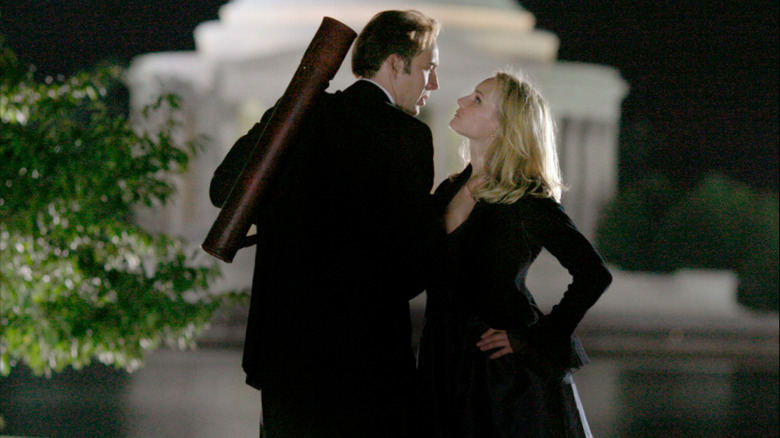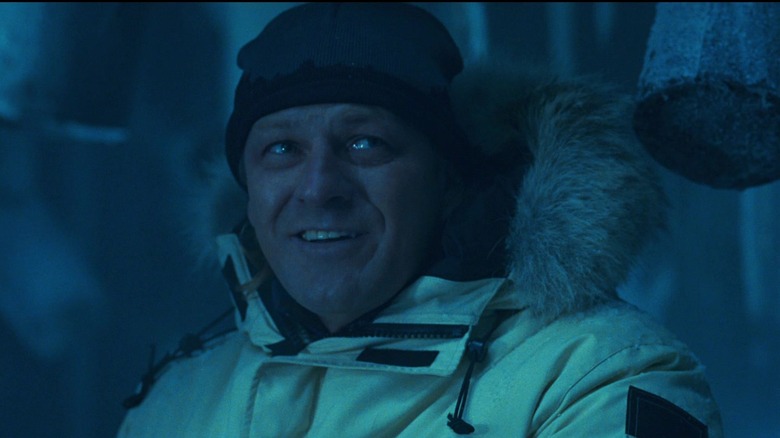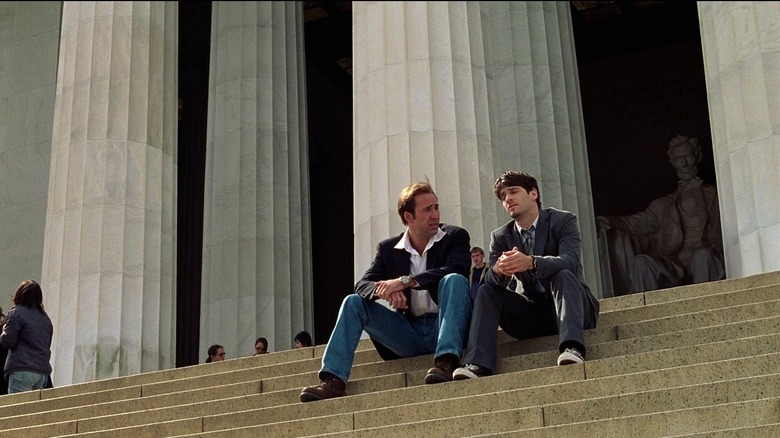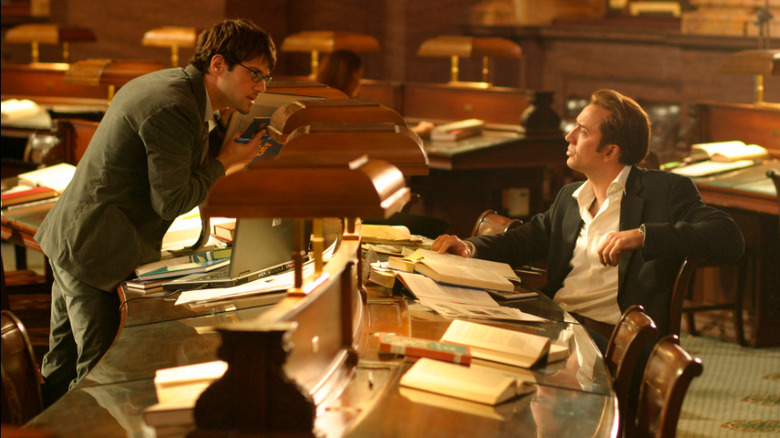Putting The 'Treasure' In National Treasure Wasn't An Easy Thing To Do
"I'm gonna steal the Declaration of Independence." With those famous words, "National Treasure" secured its place in the history of cinema. Action movie heroes had stolen briefcases, buried gold, the Holy Grail, and various James Bond-style doomsday devices. But they had never before thought to steal the Declaration of Independence. Only Nicolas Cage, inhabiting the role of principled treasure hunter Benjamin Franklin Gates, would think to defy precedent and filch the Declaration from its holding place in the National Archives.
You might think from the centrality of the Declaration of Independence in the film's marketing that the "National Treasure” is the Declaration itself. Yet that is incorrect. Within the skewed universe of "National Treasure," the Declaration of Independence is not a treasure, but a cipher. Written on the back of the document in code are the directions to the real treasure, a mass of gold, jewels, and other precious objects. It is this latter, far more mundane treasure that Cage and company pursue for the rest of the film after the Declaration is stolen.
More reality and a lot more history
According to an interview on MovieWeb, it took time for the crew of "National Treasure" to figure out exactly what the treasure in the title should be. The film's development began as early as 1997, stemming from an idea proposed by Oren Aviv and Charles Segars. "National Treasure" was delayed from its initial target of 2000 to release in 2004. Jon Turteltaub, the director of the film, said in a MovieWeb feature that "from what the first draft to the final draft is an enormous difference." Over the course of production, the filmmakers strove to inject "more reality and a lot more history" into an otherwise silly premise. This bears out in the consistency of the many clues and historical jokes in the film, which tend to map to existing trivia rather than made-up conspiracies.
But the heart of the film remains in the journey rather than the destination. In Turteltaub's words, "we were a treasure hunt movie about a map more than we were about treasure." The highlight of "National Treasure" is the National Archives heist sequence, where Nicolas Cage wears a tuxedo and steals the Declaration. The film follows this up with some fun little puzzles involving daylight savings time and secret code. But it simply doesn't have another set piece in the tank able to match up to the earlier sequence. With the crew aiming to stick to "reality," it is no surprise that the only climactic "treasure" they could dream up was a literal room full of gold.
The sword of Alexander
For comparison, look at the climaxes of Dan Brown's infamous Robert Langdon books. Each one, loosely inspired by "real" historical mysteries, finds new ways to shock the reader in the climax. "The Lost Symbol" charmingly suggests the secret knowledge of the Masons may be found in the sunrise seen from the top of the Washington Monument. Meanwhile, the climax of "Inferno" renders a third of humanity sterile, then makes the argument that this may be for the best. A film as absurd as "National Treasure," which begins with the stealing of the Declaration of Independence, might have found an equally over-the-top climax to wrap things up. After all, Nicolas Cage makes a reference to "Alexander's sword" in the MovieWeb interview. A sword fight between Cage and Sean Bean featuring the sword very well might have pushed "National Treasure" a notch or two up the list of Hollywood classics.
But there's an earnest appeal to "National Treasure" I think might have otherwise been lost if the film had pursued this route. Turteltaub said something revealing regarding an early scene where Cage and fellow actor Justin Bartha plan their next move:
"... They have the chat on the steps of the Lincoln Memorial. That could have been at a lunchroom somewhere, but to me when you're making a decision about something honorable and difficult, why not in the shadow of Lincoln?"
Similarly, to sell the great edifice of United States history, Turteltaub insisted upon filming inside the Library of Congress, "the most beautiful building in the United States, that very few people have seen." In the same way James Bond films transport audiences to luxurious hotels and beautiful beaches, "National Treasure" is set on convincing audiences of the beauty of America's national landmarks, if not reminding them they exist.
I'm gonna steal the Declaration of Independence
That sincerity, as much as anything, is what really distinguishes "National Treasure" as a Nicolas Cage film. Cage has undergone a renaissance in recent years, earning critical raves for his roles in "Mandy" and "Pig." It's easy to forget he spent years in the Hollywood wilderness through the 2000s, playing thankless roles in movies like "Next" and "The Wicker Man." Yet Nicholas Cage never quite phoned it in. He remains the most memorable part of the rather banal (if not bad) movies not because he played his role for laughs, but because he was always going for something even when the film around him barely existed. "National Treasure" distinguishes itself from the worst Cage flicks because its belief in cool American history facts as a national good just about equals Cage's commitment to the role.
The same sincerity can't help but date "National Treasure" to the early 2000s. As we know today and did then, the founders were not quirky treasure-hiding polymaths, but wealthy and powerful slaveholders who skewed the Constitution in favor of Southern landowners. The very idea of an "American conspiracy" disguises an inconvenient truth; that there is no single American story, but instead a serpent's nest of historical narratives warring for supremacy across decades. With that in mind, perhaps the "treasure" of "National Treasure" is perfectly apt. Dig to the root of the American experiment, and of course you'd find a room full of hidden money, inherited from the Templars, who likely stole it from somewhere else. What else would it be?



